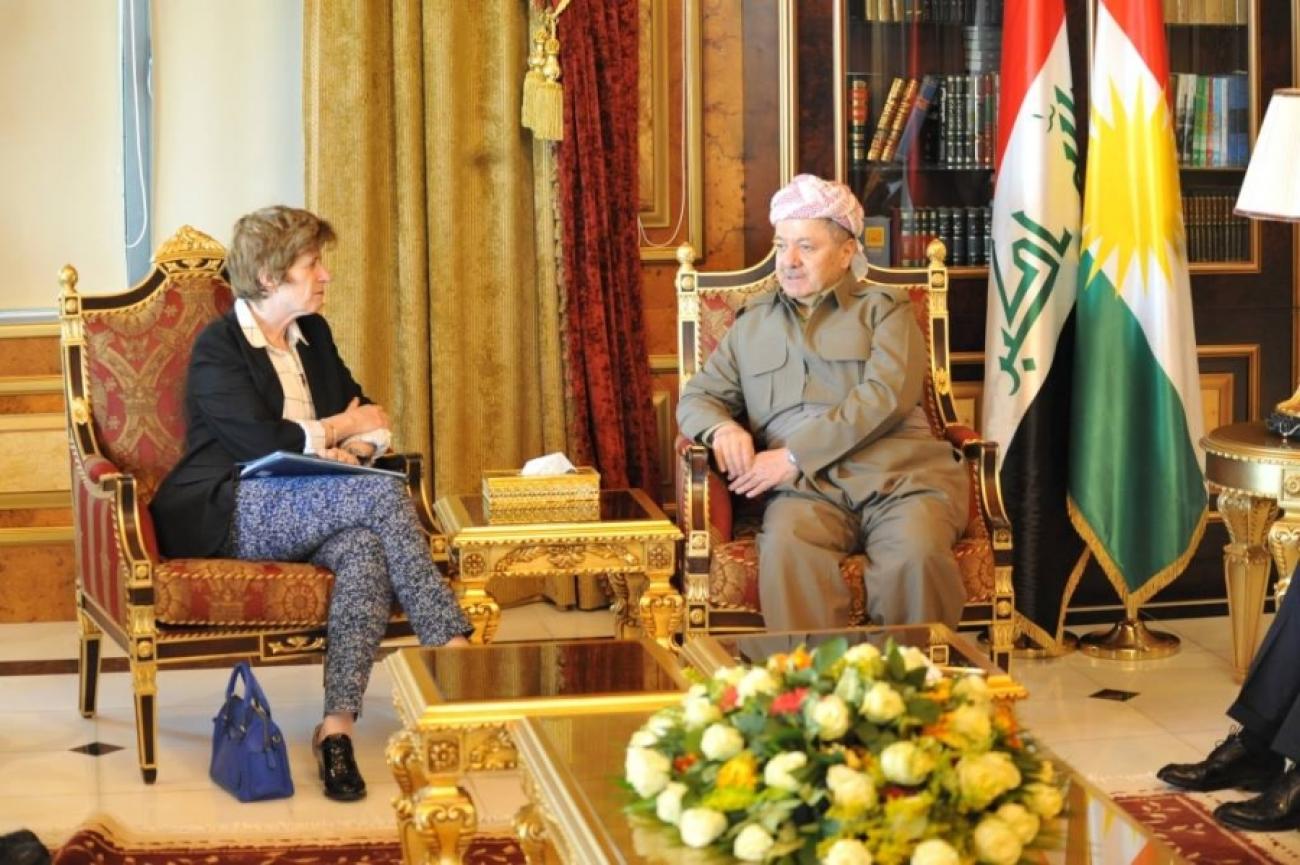DHC Gilmore Meets KRI President, PUK’s Deputy Secretary-General, Praises Kurdistan’s Cooperation on Human Rights Issues as well as Economic and Social Development Progress

The United Nations Deputy High Commissioner for Human Rights, Ms. Kate Gilmore, met with the President of the Kurdistan Region of Iraq
The United Nations Deputy High Commissioner for Human Rights, Ms. Kate Gilmore, met on Thursday, 21 April 2016, with the President of the Kurdistan Region of Iraq, Masoud Barzani, at his official residence in Salahidin.
President Barzani informed Ms. Gilmore that he greatly welcomed the work of the United Nations Human Rights Office in the Kurdistan Region and he affirmed his government's commitment to human rights. He noted that the Kurdish people and minority ethnic and religious communities had suffered greatly from decades of violence and human rights violations, including the atrocities committed against them by Saddam Hussein, and now from those being perpetrated at the hands of the so-called Islamic State of Iraq and Syria (ISIL).
Despite scarce resources, the Kurdistan Region has welcomed over two million people displaced from other areas of Iraq who are being supported largely by the Kurdish people themselves. The President also informed the Deputy High Commissioner that he had given specific instructions to the Kurdish Region of Iraq’s Peshmerga forces to protect civilians when carrying out military operations to liberate areas from ISIL. He called on the international community to do more to ensure humanitarian assistance for the displaced. He also pledged the full support of his office to the United Nations Office of the High Commissioner for Human Rights in carrying out its mandate in the Kurdistan Region of Iraq.
Ms. Gilmore thanked the President for his leadership on human rights issues, and the support and cooperation he had shown to the Office of the High Commissioner for Human Rights in promoting the respect and protection of human rights in the Kurdistan Region. She noted that the Kurdish people had made great progress in terms of economic and social development, despite their terrible history, and had made significant gains in ensuring the respect for the rule of law and the protection of human rights in the Kurdistan Region.
“By air, it is but a short journey from Baghdad to the Kurdistan Region of Iraq, but a great distance between the two in terms of people’s access to peace and security, and in the respect and protection of their human rights and the rule of law. The commitment of the people of Kurdistan to advancing the respect and protection of human rights is evidenced by the many advances they have made, particularly in relation to the rights of women, of children and of people with disabilities. The generosity they have shown to people from all backgrounds who are fleeing the effects of violence, conflict and gross human rights abuses is exceptional,” Ms. Gilmore said.
The Deputy High Commissioner also met with the Deputy Secretary-General of the Patriotic Union of Kurdistan (PUK), Dr. Barham Salih. Dr. Salih also highlighted the terrible toll that human rights violations and abuses have inflicted on the people of the Kurdistan Region of Iraq, particularly those being perpetrated by ISIL. He noted that the Kurdistan Region had welcome significant numbers of refugees from Syria as well as large numbers of internally displaced people. Dr.Salih noted the region's achievements in women’s rights, the rights of persons with disabilities and the rule of law – but emphasized that more needed to be done. With regards to freedom of expression, he highlighted the need for programmes to improve journalists’ understanding of and commitment to professional and ethical standards which would also help to ensure a plurality of views is available to the public while not encouraging politicization of the media. Dr. Salih stated that ‘post-ISIL’ Iraq would need dialogue among all communities founded on respect for human rights. He called on the Office of the High Commissioner for Human Rights to continue its work supporting civil society and Government throughout the Kurdistan Region.
“It is absolutely critical that the people of Iraq start to plan for the ‘day after’ ISIL now," the Deputy High Commissioner stated. “A future oriented dialogue among all communities within Iraq is needed now, not only to pave the way to justice for the victims of the gross human rights violations and abuses to which the peoples of Iraq have been subjected, but to forge a framework of understanding on which trust can be rebuilt and full respect and protection for the rights of Iraq’s diverse ethnic and religious communities can be secured. The Office of the High Commissioner for Human Rights will do all it can to support such dialogue – among individuals and communities at the local and national levels - as the best foundation for an inclusive, prosperous and peaceful future for all the peoples of Iraq.”

